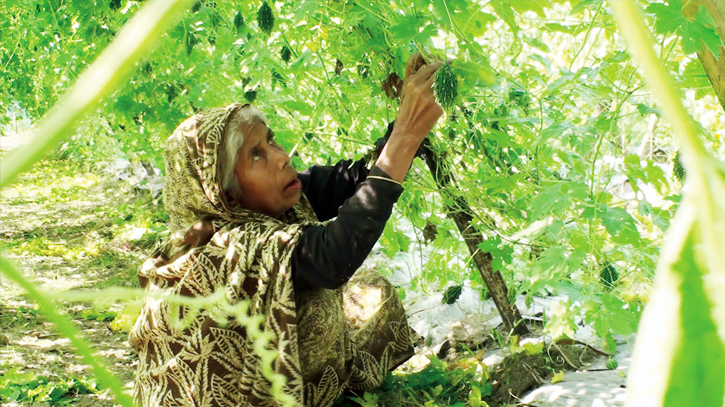
Photo : Messenger
Despite the tumultuous nature of the vegetable market, the hardworking farmers of Lalmonirhat, a northern border district, are currently experiencing a surge of joy as they witness early varieties of vegetables fetching commendable prices in the market.
At present, farmers are diligently tending to their fields, nurturing various winter vegetables, transforming the landscape into a vibrant sea of green. The market is brimming with a diverse assortment of produce, including Corolla, Beans, Cucumber, Eggplant, Radish, Cabbage, and Cauliflower.
Notably, this year has witnessed an upswing in farmers' enthusiasm for cultivation, driven by the prospect of improved prices for all their vegetables. Provided that the weather remains favorable, they anticipate strong market prices throughout the winter.
According to data from the Lalmonirhat District Agriculture Extension Department, vegetable cultivation covered 15,335 hectares of land in the district last year, with 1,125 hectares dedicated to early vegetable cultivation. This year, the target for vegetable cultivation has increased to 15,465 hectares, including 1,250 hectares earmarked for early vegetables.
Driven by the allure of good market prices, the demand for vegetable cultivation has surged in various areas across the district. Mogalhat, Kulaghat of Sadar Upazila, Kamalbari, Bara Kamalbari, and Durgapur of Aditmari Upazila are among the regions actively participating in vegetable production. These vegetables are not only meeting local demand but also being exported to different parts of the country.
Farmers have been capitalizing on this promising market. They are wholesaling their produce directly from the fields, with corolla priced at Tk 70 per kg, pepper at Tk 160, cauliflower at Tk 70, brinjal at Tk 40, and cucumber at Tk 25 per kg. Unfortunately, areas not dedicated to early vegetable cultivation have suffered crop losses due to rain and flooding.
Abdullah, a farmer in Bara Kamalbari area, expressed his satisfaction with this year's agricultural prospects. "I've been engaged in agriculture for a long time. I cultivated vegetables on a total of three acres of land. This year, I planted about 1 acre of gourd and have already earned Tk. 2 lakh. I'm optimistic about another Tk. 2- Tk 2.5 lakh in earnings. I've devoted 75 percent of my land to cucumbers, initially selling for 50 thousand rupees and anticipating an additional one lakh rupees. The favorable prices for chili and brinjal have further added to my delight."
Sujal Miah, a resident of Sadar's Mogulhat Kanpur village, voiced the challenges faced by farmers. "Land subsidence caused by floods and rainwater retention has led to the loss of many seedlings in early vegetable cultivation. Additionally, the rising costs of fertilizers, diesel, and pesticides have increased the overall cost of farming. However, I've been cultivating early vegetables annually. This year, I've sown cauliflower in 5 bighas of land, which will be ready in another 4 to 5 days. The current market price for cauliflower is Tk 70 per kg. With these prices, I hope to recoup my expenses and make a profit."
Hamidur Rahman, Deputy Director of the Lalmonirhat District Agriculture Extension Department, highlighted the positive influence of last year's good vegetable prices on this year's surge in farming interest. He stated, "Our extension services are constantly monitoring the fields, providing advice to farmers through on-site visits and inquiries."
However, the rise in vegetable prices has not been without consequences. The middle and lower classes are grappling with the skyrocketing prices of essential vegetables, from chilies to potatoes. At Senmaitri Bazar, the busiest market in the city, these vegetables are being sold at prices ranging from Tk. 20 to Tk. 25 per kg. This inflation has caused significant distress among lower-middle-class consumers.
ASM Masum-ud-Daula, Assistant Director of the Lalmonirhat Consumer Directorate, assured that the government had fixed prices for potatoes, which are currently being monitored. He mentioned that monitoring of the raw market had not yet commenced, but strict legal action would be taken against any retailer making purchases without proper receipts.
Messenger/Shakib/Sun Yath








